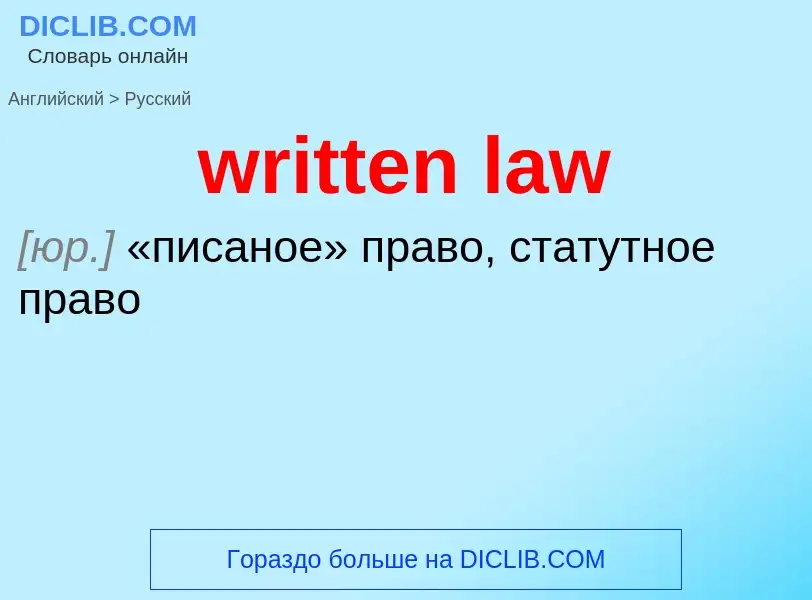Translation and analysis of words by ChatGPT artificial intelligence
On this page you can get a detailed analysis of a word or phrase, produced by the best artificial intelligence technology to date:
- how the word is used
- frequency of use
- it is used more often in oral or written speech
- word translation options
- usage examples (several phrases with translation)
- etymology
written law - translation to russian
['pentətju:k]
существительное
библейское выражение
Пятикнижие
общая лексика
бизнес-правила
предложения SQL и операторы, настраивающие значения одной или более колонок в базе данных на специфические правила деятельности организации [пользователя]. Так, если в колонке "Зарплата" может быть значение от 0 до 10 000 долл., то бизнес-правило может ограничить верхнее значение в соответствии с классификатором штатного расписания
Definition
Wikipedia
The Torah (; Biblical Hebrew: תּוֹרָה Tōrā, "Instruction", "Teaching" or "Law") is the compilation of the first five books of the Hebrew Bible, namely the books of Genesis, Exodus, Leviticus, Numbers and Deuteronomy. In that sense, Torah means the same as Pentateuch () or the Five Books of Moses. It is also known in the Jewish tradition as the Written Torah (תּוֹרָה שֶׁבִּכְתָב, Tōrā šebbīḵṯāv). If meant for liturgic purposes, it takes the form of a Torah scroll (Sefer Torah). If in bound book form, it is called Chumash, and is usually printed with the rabbinic commentaries (perushim).
At times, however, the word Torah can also be used as a synonym for the whole of the Hebrew Bible or Tanakh, in which sense it includes not only the first five, but all 24 books of the Hebrew Bible. Finally, Torah can even mean the totality of Jewish teaching, culture, and practice, whether derived from biblical texts or later rabbinic writings. The latter is often known as the Oral Torah. Representing the core of the Jewish spiritual and religious tradition, the Torah is a term and a set of teachings that are explicitly self-positioned as encompassing as many as 70 or potentially infinite faces and interpretations, making an unequivocal definition of Torah impossible.
Common to all these meanings, the Torah consists of the origin of Jewish peoplehood: their call into being by God, their trials and tribulations, and their covenant with their God, which involves following a way of life embodied in a set of moral and religious obligations and civil laws (halakha). The "Tawrat" (also Tawrah or Taurat; Arabic: توراة) is the Arabic name for the Torah within its context as an Islamic holy book believed by Muslims to have been given by God to the prophets and messengers amongst the Children of Israel.
In rabbinic literature, the word Torah denotes both the five books (תורה שבכתב "Torah that is written") and the Oral Torah (תורה שבעל פה, "Torah that is spoken"). The Oral Torah consists of interpretations and amplifications which according to rabbinic tradition have been handed down from generation to generation and are now embodied in the Talmud and Midrash. Rabbinic tradition's understanding is that all of the teachings found in the Torah (both written and oral) were given by God through the prophet Moses, some at Mount Sinai and others at the Tabernacle, and all the teachings were written down by Moses, which resulted in the Torah that exists today. According to the Midrash, the Torah was created prior to the creation of the world, and was used as the blueprint for Creation. The majority of Biblical scholars believe that the written books were a product of the Babylonian captivity (c. 6th century BCE), based on earlier written sources and oral traditions, and that it was completed with final revisions during the post-Exilic period (c. 5th century BCE).
Traditionally, the words of the Torah are written on a scroll by a scribe (sofer) in Hebrew. A Torah portion is read publicly at least once every three days in the presence of a congregation. Reading the Torah publicly is one of the bases of Jewish communal life.

![Museum of Jewish Art and History]] Museum of Jewish Art and History]]](https://commons.wikimedia.org/wiki/Special:FilePath/Coffre et rouleau de Torah ayant appartenu à Abraham de Camondo chef de la communauté juive de Constantinople 1860 - Musée d'Art et d'Histoire du Judaïsme.jpg?width=200)
![The [[supplementary hypothesis]], one potential successor to the documentary hypothesis The [[supplementary hypothesis]], one potential successor to the documentary hypothesis](https://commons.wikimedia.org/wiki/Special:FilePath/Diagram of the Supplementary Hypothesis.jpg?width=200)
![Josiah hearing the reading of Deuteronomy (illustration by [[Julius Schnorr von Carolsfeld]]) Josiah hearing the reading of Deuteronomy (illustration by [[Julius Schnorr von Carolsfeld]])](https://commons.wikimedia.org/wiki/Special:FilePath/Josiah.gif?width=200)

![Page pointers, or [[yad]], for reading of the Torah Page pointers, or [[yad]], for reading of the Torah](https://commons.wikimedia.org/wiki/Special:FilePath/Page Pointers for reading of Torah.jpg?width=200)
![Museum of Jewish Art and History]] Museum of Jewish Art and History]]](https://commons.wikimedia.org/wiki/Special:FilePath/Présentation de la Loi, Edouard Moyse (1860) - Musée d'art et d'histoire du Judaïsme.jpg?width=200)
![Reading of the Torah with [[Yad]] Reading of the Torah with [[Yad]]](https://commons.wikimedia.org/wiki/Special:FilePath/ReadingOfTheTorah.jpg?width=200)

!["Jack and the Giant Joint-Stock", a cartoon in ''Town Talk'' (1858) satirizing the 'monster' joint-stock economy that came into being after the [[Joint Stock Companies Act 1844]] "Jack and the Giant Joint-Stock", a cartoon in ''Town Talk'' (1858) satirizing the 'monster' joint-stock economy that came into being after the [[Joint Stock Companies Act 1844]]](https://commons.wikimedia.org/wiki/Special:FilePath/Jack and the Giant Joint-Stock.jpg?width=200)
